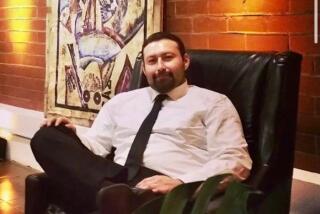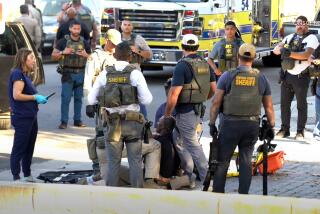Jury to Hear Confession of Deputy’s Alleged Killer
Because Michael Raymond Johnson waived his right to remain silent, a jury will be allowed to hear his confession in November when he goes on trial in the slaying of Ventura County Sheriff’s Deputy Peter Aguirre Jr., a judge ruled Monday.
Superior Court Judge Steven Z. Perren ruled that Johnson freely and knowingly incriminated himself as he lay in Ventura County Medical Center being treated for gunshot wounds on the night of the fatal Meiners Oaks shootout.
Johnson had asked for a lawyer and refused to talk to detectives and investigators several times on the night of July 17, 1996, Perren found.
But when psychiatrist Donald Patterson began to ask him about his history of mental illness and substance abuse, it was Johnson who opened up and began revealing details of the shooting that are captured on tape, Perren ruled.
“The most powerful and compelling evidence of the defendant’s understanding [of his rights] is that tape,” Perren said Monday at the end of a hearing that lasted more than a week.
“He knew what was going on, he knew what use it would be put to . . . and it was important to him that the facts be known.”
Deputy Public Defender Todd Howeth had vigorously argued that Johnson’s Miranda rights were violated several times that night.
Sheriff’s detectives and prosecutors, including Dist. Atty. Michael D. Bradbury, asked several times if Johnson wanted to make a statement. But Johnson always declined, saying he would rather talk to his lawyer first, Howeth argued.
“Here, there was a clear invocation of the defendant’s right to silence and the defendant’s right to counsel,” Howeth argued.
Johnson’s resistance was being unfairly worn down by the handcuffs lashing him to his hospital gurney, by treatment that doctors were administering for his four bullet wounds, Howeth said.
*
The U.S. Supreme Court’s landmark 1965 Miranda decision is meant to prevent law enforcement from “exploiting the coercive nature of confinement to extract incriminating statements from suspects,” Howeth said.
“It’s hard to imagine a more coercive environment than being tethered to various machines, virtually at the mercy of anyone who wants to come in and question you,” he said.
What’s more, Patterson never fully reread Johnson’s Miranda rights to him before interviewing him, Howeth said.
Howeth asked Perren to forbid prosecutors to present the confession itself to jurors; to block Patterson himself from testifying on his expert opinion about Johnson’s mental state based on the interview; and to forbid prosecutors from using Patterson’s testimony about the conversation to impeach other expert witnesses.
Although Johnson eventually began describing the shooting to Patterson, there was no “knowing, intelligent waiver” of his Miranda rights as required by law, Howeth said.
But Deputy Dist. Atty. Matthew Hardy argued that officers and investigators read the Miranda rights several times that night to Johnson, who kept giving mixed signals about whether he would talk.
“The defendant was in control, his rights were respected and there was no coercion,” Hardy argued. “He left the door open to further interrogation.”
After learning that Johnson declined to talk to Sheriff’s Det. Robert Young, Bradbury went into the room where the suspect was being treated for his wounds and offered, “I understand you do not want to make a statement to us at this time.”
Hardy told the judge that Johnson replied, “I feel a little bit in shock right now, I may want to talk to you later.”
That offer to talk later was “tantamount to a waiver” of Johnson’s rights, Hardy argued. He added, “His rights were scrupulously honored.”
Then Johnson accepted an offer to talk with a psychiatrist, and Patterson began their discussion simply by asking questions on Johnson’s medical and mental health background, Hardy said.
The doctor asked, “Do you understand your rights as they’ve been explained to you?” and Johnson indicated that he did, and he wanted to talk anyway, Hardy said.
Perren pointed out that Johnson had said earlier--and just as clearly--that he would rather wait to talk to police until he could speak to his lawyer.
*
But he also agreed with Hardy’s assertion that Johnson clearly understood he was giving up his right to remain silent and speak to a lawyer when he told Patterson, “You know, my lawyer’s really going to be [upset].”
Johnson is to be tried Nov. 3 on charges that he shot Aguirre to death after Aguirre responded to a domestic call at the home of Johnson’s estranged wife in Meiners Oaks. Prosecutors are seeking the death penalty.
More to Read
Sign up for Essential California
The most important California stories and recommendations in your inbox every morning.
You may occasionally receive promotional content from the Los Angeles Times.









